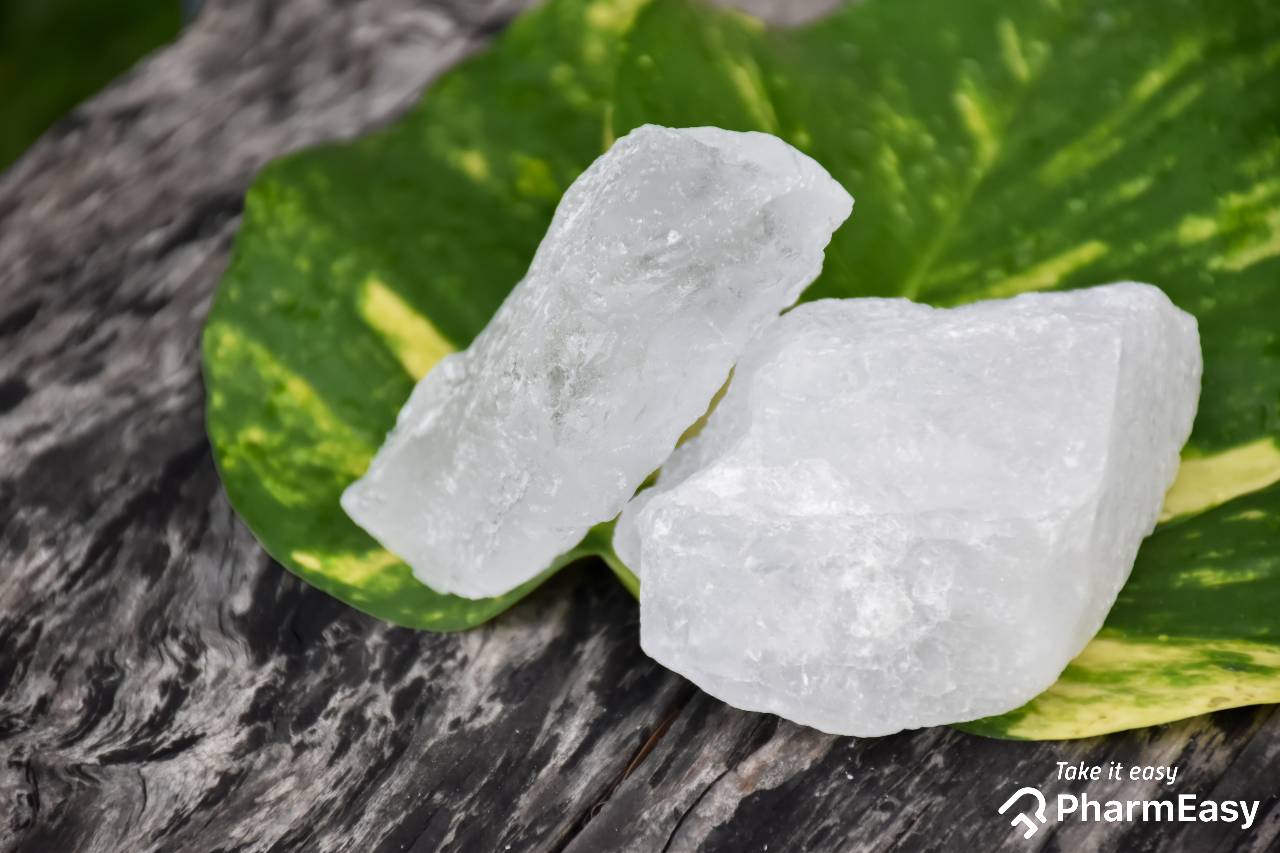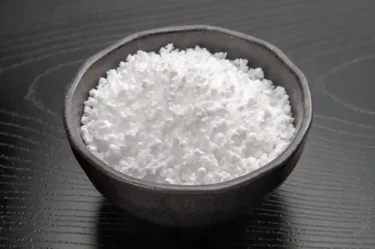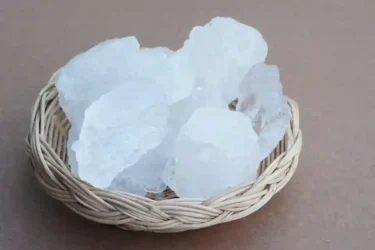Alum: Uses, Benefits & Side Effects
By Dr Ashok Pal +2 more

Get,

to manage your symptom
Get your,


4 Cr+ families
benefitted

OTP sent to 9988776655



You’ve successfully subscribed to receive
doctor-approved tips on
Whatsapp

Get ready to feel your best.

Hi There,
Download the PharmEasy App now!!


Register to Avail the Offer
Send OTPBy continuing, you agree with our Privacy Policy and Terms and Conditions

Hi There,
Sign up on PharmEasy now!!
Trusted by 4 crore+ families

OTP sent to 9988776655



You have unlocked 25% off on medicines




Code: NU25

Comments


Leave your comment here
By Dr Ashok Pal +2 more
Table of Contents
Alum is a mineral salt found in nature in both pure and impure forms. It is obtained from the soil ore found in Nepal, Bihar, Punjab, and the Kathiawar area. It is a colourless, clear, odourless, crystalline mass or granular powder with a sweetish, astringent flavour. It is found in Egypt, Italy, England, Germany and India.
In Indian households, alum is commonly known as phitkari or phatkari. Other names for alum include:

When heated, it melts at around 200 degrees1, resulting in an anhydrous salt. It is frequently contaminated with impurities in markets. It may be made suitable for potential health uses. It is found in many pharmaceutical, cosmetic and food products. It has a strong astringent quality. It comes in four different colours: white, green, yellow, and red. White is known as phitkari, green is known as heera kasees, yellow is known as kasees and red is known as surkh phitkari. The most notable quality alum, according to Unani physicians, is one that easily shatters.
Alum is composed of the following:
Various properties of alum are listed below.

Different alum concentrations were tested against Proteus mirabilis, which causes urinary tract infections. These studies4 suggested that alum may have antimicrobial properties, as it appeared to reduce the motility of the bacteria in culture media.
Using an in-vitro bioassay method5, the antibacterial activity of alum and clove extract was assessed against pathogens such as S. aureus, S. epidermidis, E. coli, and K. pneumoniae. Potential antibacterial activity was observed in the alum and clove extracts, suppressing bacterial growth isolated from various infection sites.
Using an alum mouthwash and rinsing twice a day might be efficient in lowering the level of salivary mutans Streptococci in the children.
The antifungal activity of alum was tested on yeast isolated from mouth lesions. It was concluded that alum might help control fungal isolates and it might be helpful against infections such as oral thrush and mouth ulcers. However, more studies are required to ascertain the use of alum for infections.

In an animal mode6, the antiplatelet action of alum was investigated in terms of platelet aggregation and bleeding time. After alum injection, platelet aggregation was significantly lowered. The time it took for an animal model to bleed after receiving an alum injection was also much longer. The study’s findings suggest that alum might be helpful as an antiplatelet drug. However, more studies on humans are required to prove its effectiveness.

In an obese animal model7, oral intake of potash alum showed a potential to cause a possible reduction of body weight, food intake, serum triglycerides, total cholesterol, and high-density lipoproteins. This shows the possible anti-obesity effect. However, more studies on humans are required to prove such effects.

Recurrent stomatitis is caused by antibiotics, painkillers, and other drugs. A topical application of alum can be helpful for this condition. It may help with stomatitis and may be administered along with honey. However, more research is required to prove the potential use of alum for stomatitis. Kindly consult a doctor and do not self-medicate.

Alum might show some effect on post-operative wounds. Alum may be dissolved in water and used to help with the post-operative wounds8. There is a need for more studies to prove its effectiveness for post-operative wounds. Kindly do not self-medicate, as healing of post-operative wounds is crucial.

Animal studies have shown the possible anti-tumour effect of alum. An animal model was injected with alum9. The results of the study indicated potential for tumour growth reduction in the animal model. However, more research is required to prove such claims. Moreover, tumours should be diagnosed and treated by doctors. Therefore, kindly consult a doctor.
I’ve got a fascinating fun fact for you3! Trotula, a famous gynaecologist from the 12th century, wrote a book about women’s health. According to her, alum might be able to lighten blemishes on the skin and even dye those beautiful hair strands of yours.
Dr. Rajeev Singh, BAMS
Alum can be used as alum powder or dissolved in water to make a solution. Your Ayurvedic physician will prescribe you the dose and form as per your need.
You must consult a qualified doctor before taking any herbal supplements. Do not discontinue or replace an ongoing treatment of modern medicine with an ayurvedic/herbal preparation without consulting a qualified doctor.
Let me tell you a secret3 about using a surma (collyrium) made from alum. This special mixture might help relieve pain, reduce swelling, and soften hardened eyelids. Not only that, but it may also act as a cleanser for the conjunctiva, the thin membrane that covers the front of your eye. And the best part? It may even improve your vision!
Dr. Smita Barode, B.A.M.S, M.S.
Several side effects associated with alum use are listed below.
Therefore, it is advised that you do not self-medicate and take advice from a doctor before using alum.
I have read that Pliny the Elder, a Roman historian3, believed that alum could do some fascinating things. According to him, alum may have the power to possibly control and reduce perspiration, making you sweat less. Additionally, it was believed that alum might have the ability to counteract unpleasant odours, making the armpits smell more pleasant.
Dr. Siddharth Gupta, B.A.M.S, M.D (Ayu)
Also Read: Jamun (Java Plum): Uses, Benefits & Side Effects
The safety studies of alum on pregnant and breastfeeding women have not been carried out. Therefore, it should only be taken under the supervision and advice of a doctor. No research has been done on the safe use of alum in children and the elderly.
Also Read: Jaggery: Uses, Benefits, Side Effects and More
There is not much information available on how alum interacts with other medications. Hence, you should consult a doctor before taking alum and disclose to your doctor if you take any other medicine or supplement.
Also Read: Lychee: Uses, Benefits, Side Effects and More By Dr. Rajeev Singh
Alum is a mineral found in nature in both pure and impure forms, derived from alumen ore. It is a colourless, clear, odourless, crystalline mass or granular powder with a sweetish astringent flavour.
Alum might be helpful for bleeding gums, gingivitis, pyorrhoea, tonsillitis, pharyngitis, piles, vaginal inflammation, leucorrhoea (whitish or yellowish coloured discharge from the vagina), gonorrhoea, kidney and bladder abscess (swelling with pus), renal and bladder stones, conjunctivitis, ear abscess, dandruff, burns, breast hypertrophy (increase in size), stomatitis, dementia (memory loss), asthma and bleeding. However, more research is required to prove the effectiveness of alum for the above-mentioned conditions. Therefore, kindly consult a doctor. Do not self-medicate.
It can be made suitable for potential use by humans by dissolving it in boiling water, filtering the solution, and evaporating it to produce crystals, which can be preserved for future use.
Yes, alum is soluble in water. As the molecular formula of alum contains water molecule, it is water-soluble.
Yes, we can drink alum water as alum is used for water purification. There may be some reactions and side effects of alum, thus take advice from your doctor.
Yes, alum is edible. Potassium alum is an active ingredient in baking powder.
The chemical formula of potassium alum is K2SO4Al2(SO4)3.24 H2O.
Alum is used in depilatory waxes that are used for the removal of body hair or applied to freshly waxed skin as a demulcent (relieves inflammation or skin irritation). However, a doctor/specialist should be consulted before using it for the above-mentioned purpose.
It has been used to purify turbid liquids since ancient times. Alum is used to purify domestic wastewater. It is added to water to cause the aggregation of particles and form flocs.
Alum has a sweetish astringent taste.
It is known as phitkari, phatkiri, phatphadi, sambe-mani, aluminous sulphate, sulphate of alumina and potash, sulphate of aluminium and ammonium, phatkari, phitikhari, phitkiri, patikar, turati, phitki, phatki, fatkari, sphatikari, surashtraja, kamakshi, tuvari, pitki, pati-karam, padikharam, and shinacarum.
It is found in Egypt, Italy, England, Germany, and India. In India, it is primarily found in Assam, Punjab, and Bihar.
Dry skin, skin irritation, burn, dizziness, throat tightness, fluid accumulation around the eye, hives, hypersensitivity reaction, allergic reaction, puffy face from water retention, skin ulcer and throat swelling are the side effects of alum. Therefore, it should not be used without a doctor’s advice.
Yes, alum is good for obesity. The oral intake of potash alum might help in the reduction of body weight, food intake, serum triglycerides, total cholesterol, and high-density lipoproteins in an obese animal model. However, more research is required to prove such claims. Therefore, do not self-medicate. Kindly consult a doctor before using it.
Alum might be helpful for ulcers. Topical application of alum might be helpful for ulcers caused by recurrent usage of several medications like antibiotics, painkillers, etc. However, more research is required to prove such claims.
Yes, alum can be used after shaving due to its astringent properties.
Alum might be helpful for bleeding gums and gum inflammation. However, more research is required to prove the effectiveness of alum for bleeding gums. Kindly visit a dentist.
Disclaimer: The information provided here is for educational/awareness purposes only and is not intended to be a substitute for medical treatment by a healthcare professional and should not be relied upon to diagnose or treat any medical condition. The reader should consult a registered medical practitioner to determine the appropriateness of the information and before consuming any medication. PharmEasy does not provide any guarantee or warranty (express or implied) regarding the accuracy, adequacy, completeness, legality, reliability or usefulness of the information; and disclaims any liability arising thereof.
Comments

Leave your comment...

View all comments(1)
You may also like
Thank you so much….I thought I’d die after I mistakenly swallowed a spoon of alum water thinking it was my prepared lemon water…..Ooh